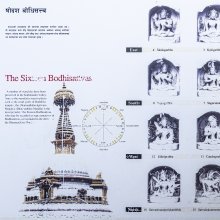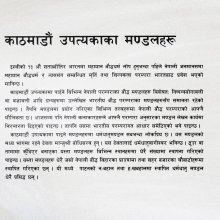Prasiddha: 19 definitions
Introduction:
Prasiddha means something in Buddhism, Pali, Hinduism, Sanskrit, Jainism, Prakrit, Marathi, Hindi. If you want to know the exact meaning, history, etymology or English translation of this term then check out the descriptions on this page. Add your comment or reference to a book if you want to contribute to this summary article.
Alternative spellings of this word include Prasiddh.
Images (photo gallery)
In Hinduism
Vyakarana (Sanskrit grammar)
Source: Wikisource: A dictionary of Sanskrit grammar1) Prasiddha (प्रसिद्ध).—Established in existence: cf. क्रमेण नार्थः पदसंहिताविदः पुरा (krameṇa nārthaḥ padasaṃhitāvidaḥ purā)sप्रसिद्धा श्रयपूर्वसिद्धिभिः (prasiddhā śrayapūrvasiddhibhiḥ), R. Pr. XI.34 where the Kramapatha is said to be one which was not established before the Samhitapatha;
2) Prasiddha.—Known ; cf. अनिटि प्रसिद्धे क्सो भविष्यति (aniṭi prasiddhe kso bhaviṣyati) M. Bh. on P. III. 1.45 Vart. 4, लोकत एते शब्दाः प्रसिद्धाः स्त्री पुमान् नपुंसकमिति (lokata ete śabdāḥ prasiddhāḥ strī pumān napuṃsakamiti) M. Bh. on P. IV. 1.3:
3) Prasiddha.—Brought about, accomplished, realized; तथास्य छः प्रसिद्धो भवति (tathāsya chaḥ prasiddho bhavati) M. Bh. on P. IV. 1.89 Vart. 2, सर्वत्रैव जश्त्वेन सिद्धं स्यात् (sarvatraiva jaśtvena siddhaṃ syāt), M. Bh. on P.VIII 2.25

Vyakarana (व्याकरण, vyākaraṇa) refers to Sanskrit grammar and represents one of the six additional sciences (vedanga) to be studied along with the Vedas. Vyakarana concerns itself with the rules of Sanskrit grammar and linguistic analysis in order to establish the correct context of words and sentences.
Shaktism (Shakta philosophy)
Source: Google Books: ManthanabhairavatantramPrasiddha (प्रसिद्ध) refers to “one who is famous”, according to the Manthānabhairavatantra, a vast sprawling work that belongs to a corpus of Tantric texts concerned with the worship of the goddess Kubjikā.—Accordingly, “The remnant of that (Kaula) gathering was thrown into the ocean of milk and all that Kaulika sacrificial pap was eaten by a fish. There arose the one there called Mīna. He is Macchanda in the Age of Strife and is famous (prasiddha) in the preceding tradition. Maṅgalā is in that House”.
Source: Brill: Śaivism and the Tantric Traditions (shaktism)Prasiddhā (प्रसिद्धा) or Suprasiddhā refers to “she who is (perfectly) established” and is used to describe Goddess Śārikā, according to Sāhib Kaul’s Śārikāstrotra.—Accordingly, “[...] My devotion to you nourishes me every day, as the rise of the full moon always nourishes the ocean. On account of the true affluence of victorious devotion to you I even ignore the excellent Lakṣmī. The whole world consists of you, Goddess of Gods! Your body is consciousness, you are alone and perfectly established (su-prasiddhā). Nowhere is there ignorance. Thus, where do we see the son of a barren woman run and raise his bow? [...]”.

Shakta (शाक्त, śākta) or Shaktism (śāktism) represents a tradition of Hinduism where the Goddess (Devi) is revered and worshipped. Shakta literature includes a range of scriptures, including various Agamas and Tantras, although its roots may be traced back to the Vedas.
Purana and Itihasa (epic history)
Source: archive.org: Shiva Purana - English TranslationPrasiddha (प्रसिद्ध) refers to “one who is famous”, according to the Śivapurāṇa 2.3.28 (“Description of the fraudulent words of the Brahmacārin”).—Accordingly, as Pārvatī said to Śiva (in guise of a Brahmacārin): “[...] With the threefold Energies, Śiva blesses those who worship Him always as the lord of Energies. Every individual soul becomes fearless and conquers death by worshipping Him. Hence His designation ‘the conqueror of death’ is famous (prasiddha) in all the three worlds. Viṣṇu attains and retains his Viṣṇu-hood by His favour. Similarly Brahmā his Brahma-hood and the gods their godhood. [...]”.

The Purana (पुराण, purāṇas) refers to Sanskrit literature preserving ancient India’s vast cultural history, including historical legends, religious ceremonies, various arts and sciences. The eighteen mahapuranas total over 400,000 shlokas (metrical couplets) and date to at least several centuries BCE.
Yoga (school of philosophy)
Source: ORA: Amanaska (king of all yogas): A Critical Edition and Annotated Translation by Jason BirchPrasiddha (प्रसिद्ध) refers to the “renowned (works)” (of an author).—In his editorial preface (sampādakīya), Yognāth Swāmī (1967: 7) cites the works of Gorakṣanātha in two lists: the first contains the ‘renowned’ (prasiddha) works, which begin with the Amanaska. The second contains the ‘additional’ (atirikta) works. When these two lists are combined, they closely resemble a list of Gorakṣanātha’s works in the book Nāth Sampradāy by Hazariprasad Dvivedi, who is mentioned by Yognāth Swāmī (1967: 8) as a scholar on the Nātha tradition. [...]

Yoga is originally considered a branch of Hindu philosophy (astika), but both ancient and modern Yoga combine the physical, mental and spiritual. Yoga teaches various physical techniques also known as āsanas (postures), used for various purposes (eg., meditation, contemplation, relaxation).
In Buddhism
Tibetan Buddhism (Vajrayana or tantric Buddhism)
Source: OSU Press: Cakrasamvara SamadhiPrasiddha (प्रसिद्ध) refers to “success (of self and others)”, according to the Guru Mandala Worship (maṇḍalārcana) ritual often performed in combination with the Cakrasaṃvara Samādhi, which refers to the primary pūjā and sādhanā practice of Newah Mahāyāna-Vajrayāna Buddhists in Nepal.—Accordingly, “Until awakening I seek refuge, in the highest assembly of Buddha dharma, I hasten to accomplish awakened mind, for the success of self and others (svaparārtha-prasiddha). I raise the highest enlightened mind, I invite all beings to this place, Following the wisest conduct desired, becoming a Buddha for the world”.

Tibetan Buddhism includes schools such as Nyingma, Kadampa, Kagyu and Gelug. Their primary canon of literature is divided in two broad categories: The Kangyur, which consists of Buddha’s words, and the Tengyur, which includes commentaries from various sources. Esotericism and tantra techniques (vajrayāna) are collected indepently.
In Jainism
General definition (in Jainism)
Source: The University of Sydney: A study of the Twelve ReflectionsPrasiddha (प्रसिद्ध) refers to “that which is laid down” (in one’s own doctrine), according to the 11th century Jñānārṇava, a treatise on Jain Yoga in roughly 2200 Sanskrit verses composed by Śubhacandra.—Accordingly, “Examination of the instruction [of the Jina] is considered to be when, through the application of the instruction of the omniscient one (i.e. the Jina), [the meditator] reflects upon the true state of objects laid down in his doctrine (svasiddhānta-prasiddha)”.

Jainism is an Indian religion of Dharma whose doctrine revolves around harmlessness (ahimsa) towards every living being. The two major branches (Digambara and Svetambara) of Jainism stimulate self-control (or, shramana, ‘self-reliance’) and spiritual development through a path of peace for the soul to progess to the ultimate goal.
Languages of India and abroad
Marathi-English dictionary
Source: DDSA: The Molesworth Marathi and English Dictionaryprasiddha (प्रसिद्ध).—a (S) Notorious, public, current, generally known. 2 Clear, evident, manifest. 3 Existent or extant. Ex. śaśaviṣāṇa vandhyāputra ityādi padārtha asiddha itara sarva pra0. 4 as ad Openly, publicly, in the face of day. Ex. hī bāyakō pra0 vyabhicāra karūṃ lāgalī. lōkaprasiddha, rūḍhīprasiddha Current among the people, popular. śāstraprasiddha Occurring constantly in the Shastras: also granthaprasiddha, dēśaprasiddha, viśvaprasiddha, and numerous others.
Source: DDSA: The Aryabhusan school dictionary, Marathi-Englishprasiddha (प्रसिद्ध).—a Notorious, public. Clear. Ex- tant. ad Openly, publicly.
Marathi is an Indo-European language having over 70 million native speakers people in (predominantly) Maharashtra India. Marathi, like many other Indo-Aryan languages, evolved from early forms of Prakrit, which itself is a subset of Sanskrit, one of the most ancient languages of the world.
Sanskrit dictionary
Source: DDSA: The practical Sanskrit-English dictionaryPrasiddha (प्रसिद्ध).—p. p.
1) Renowned, famous, celebrated.
2) Decorated, ornamented, adorned; सालक्तकौ भूपतयः प्रसिद्धै- र्ववन्दिरे मौलिभिरस्य पादौ (sālaktakau bhūpatayaḥ prasiddhai- rvavandire maulibhirasya pādau) R.18.41; यथा प्रसिद्धैर्मधुरं शिरोरुहैः (yathā prasiddhairmadhuraṃ śiroruhaiḥ) Kumārasambhava 5.9;7.16.
3) Excellent; द्रव्यैः प्रसिद्धैर्मद्यागः प्रतिमादिष्व- मायिनः । भक्तस्य च यथालब्धैर्हृदि भावेन चैव हि (dravyaiḥ prasiddhairmadyāgaḥ pratimādiṣva- māyinaḥ | bhaktasya ca yathālabdhairhṛdi bhāvena caiva hi) || Bhāgavata 11.27. 15.
-ddhā A particular measure in music.
Source: Cologne Digital Sanskrit Dictionaries: Shabda-Sagara Sanskrit-English DictionaryPrasiddha (प्रसिद्ध).—mfn.
(-ddhaḥ-ddhā-ddhaṃ) 1. Famous, celebrated. 2. Adorned, ornamented. E. pra before, siddha accomplished.
Source: Cologne Digital Sanskrit Dictionaries: Cappeller Sanskrit-English DictionaryPrasiddha (प्रसिद्ध).—[adjective] accomplished, brought in order, arranged, settled; famous, celebrated; [abstract] tā† [feminine], tva† [neuter]
Source: Cologne Digital Sanskrit Dictionaries: Monier-Williams Sanskrit-English Dictionary1) Prasiddha (प्रसिद्ध):—[=pra-siddha] [from pra-sidh] mfn. (pra-) brought about, accomplished, [Kumāra-sambhava] (a-pras)
2) [v.s. ...] arranged, adorned (as hair), [ib.]
3) [v.s. ...] well known, notorious, celebrated, [Taittirīya-saṃhitā] etc. etc.
4) Prasiddhā (प्रसिद्धा):—[=pra-siddhā] [from pra-siddha > pra-sidh] f. (in music) a [particular] measure, [Saṃgīta-sārasaṃgraha]
Source: Cologne Digital Sanskrit Dictionaries: Yates Sanskrit-English DictionaryPrasiddha (प्रसिद्ध):—[pra-siddha] (ddhaḥ-ddhā-ddhaṃ) a. Celebrated; adorned; ornamented.
Source: DDSA: Paia-sadda-mahannavo; a comprehensive Prakrit Hindi dictionary (S)Prasiddha (प्रसिद्ध) in the Sanskrit language is related to the Prakrit word: Pasiddha.
[Sanskrit to German]
Sanskrit, also spelled संस्कृतम् (saṃskṛtam), is an ancient language of India commonly seen as the grandmother of the Indo-European language family (even English!). Closely allied with Prakrit and Pali, Sanskrit is more exhaustive in both grammar and terms and has the most extensive collection of literature in the world, greatly surpassing its sister-languages Greek and Latin.
Hindi dictionary
Source: DDSA: A practical Hindi-English dictionaryPrasiddha (प्रसिद्ध) [Also spelled prasiddh]:—(a) famous, reputed, well-known, renowned; ~[ddhi] fame, repute, renown.
...
Kannada-English dictionary
Source: Alar: Kannada-English corpusPrasiddha (ಪ್ರಸಿದ್ಧ):—[adjective] having a widespread, favourable reputation; famous; renowned; ಪ್ರಸಿದ್ಧವಾಗು [prasiddhavagu] prasiddhavāgu to become favourably known over a wide area; to become famous, popular.
--- OR ---
Prasiddha (ಪ್ರಸಿದ್ಧ):—
1) [noun] that which is widely known.
2) [noun] a famous man; a celebrity.
3) [noun] the remnants of the food presented to a vīraśaiva mendicant, considered as sacred.
Kannada is a Dravidian language (as opposed to the Indo-European language family) mainly spoken in the southwestern region of India.
See also (Relevant definitions)
Starts with: Prasiddha-catuh-sim-avacchinna, Prasiddhaka, Prasiddhakarmanta, Prasiddhakshatriyapraya, Prasiddhamta, Prasiddhana, Prasiddhapraya, Prasiddharanga, Prasiddhartha, Prasiddhata, Prasiddhate, Prasiddhatman, Prasiddhatva, Prasiddhavedana.
Ends with: Acaraprasiddha, Aprasiddha, Atiprasiddha, Jagaprasiddha, Jagataprasiddha, Jagatprasiddha, Kuprasiddha, Lokaprasiddha, Natiprasiddha, Samprasiddha, Suprasiddha, Vipratishiddha.
Full-text (+63): Lokaprasiddha, Aprasiddha, Prasiddhapraya, Atiprasiddha, Rupopajivana, Prasiddhata, Prasiddhatva, Prasiddhakshatriyapraya, Aprasiddhapada, Suprasiddhapadamanjari, Samprasiddha, Natiprasiddha, Pasiddha, Appiracittam, Sasidh, Jhumari, Jatali, Kasalu, Udgana, Jagatprasiddha.
Relevant text
Search found 48 books and stories containing Prasiddha, Pra-siddha, Pra-siddhā, Prasiddhā; (plurals include: Prasiddhas, siddhas, siddhās, Prasiddhās). You can also click to the full overview containing English textual excerpts. Below are direct links for the most relevant articles:
Vaisheshika-sutra with Commentary (by Nandalal Sinha)
Sūtra 3.1.1 (Objects of the senses) < [Chapter 1 - Of the Marks of Inference]
Sahitya-kaumudi by Baladeva Vidyabhushana (by Gaurapada Dāsa)
Text 7.13 < [Chapter 7 - Literary Faults]
Text 10.138 < [Chapter 10 - Ornaments of Meaning]
Text 7.40 < [Chapter 7 - Literary Faults]
Garga Samhita (English) (by Danavir Goswami)
Verse 1.18.15 < [Chapter 18 - Vision of the Universal Form]
Verse 6.19.42 < [Chapter 19 - In the First Fortress of Dvārakā, the Glories of Līlā-sarovara, etc.]
Verse 4.7.7 < [Chapter 7 - The Story of the Ayodhya Women]
Brihad Bhagavatamrita (commentary) (by Śrī Śrīmad Bhaktivedānta Nārāyana Gosvāmī Mahārāja)
Verse 1.1.2 < [Chapter 1 - Bhauma (the earthly plane)]
Verse 1.3.64 < [Chapter 3 - Prapañcātīta (beyond the Material Plane)]
Verse 1.6.6-8 < [Chapter 6 - Priyatama (the most beloved devotees)]
Shat-cakra-nirupana (the six bodily centres) (by Arthur Avalon)
Bhakti-rasamrta-sindhu (by Śrīla Rūpa Gosvāmī)
Verse 2.1.118 < [Part 1 - Ecstatic Excitants (vibhāva)]
Verse 3.2.19 < [Part 2 - Affection and Service (dāsya-rasa)]
Verse 3.5.29 < [Part 5 - Conjugal Love (mādhurya-rasa)]

